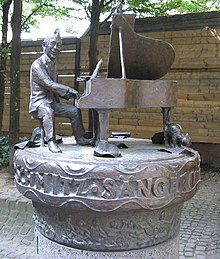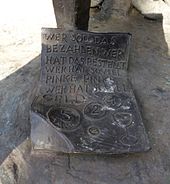Jupp Schmitz

Jupp Schmitz (born February 15, 1901 in Cologne , † March 26, 1991 ibid) was a German entertainer, pop singer and scabber singer . His most famous songs include Ash Wednesday it's all over , Who should pay for it? and there is still soup .
biography
Jupp Schmitz attended the Conservatory in Cologne for seven years , where he received classical training as a pianist . He then worked temporarily as a piano player in silent film cinemas, directed his own orchestra and performed in hotels before the Second World War.
Together with the later successful music producer Kurt Feltz , he wrote the tango Gib Acht auf Dein Herz, Margarethe , in 1935 , which Rudi Schuricke first sang and which also produced a cover version of the Vier Belcantos and a parody of the Vier Botze . It was one of his first compositions.
When the Allies approved events and parades again in 1949, Schmitz came to the carnival . His first carnival song, who should pay that, recorded on October 21, 1949, was an allusion to the price increases triggered by the currency reform and immediately became one of the most sung hits of those years. The plagiarism allegation of the Hofbräuhaus-Lied composer Wilhelm "Wiga" Gabriel could n't change anything, who believed he recognized Schmitz's successful song , She was called Marie, from 1936 and was true to her . Jupp Schmitz was able to convince the Cologne Regional Court that both melodies go back to an old folk tune, so that Gabriel lost the trial and had to bear the considerable legal costs.
In the period that followed, Jupp Schmitz, supported by his wife Bärbel, who was trained as a singer, wrote and composed many more hits and carnival songs such as Em Winter, doh schneit et, em Winter es et cold. (In winter it is snowing, in winter it is cold) , there is still soup and everything is over on Ash Wednesday . Because of its distinctive upper lip beard he was called by the Cologne affectionately called "mustache".
The shepherd boy of St. Kathrein
When Jupp Schmitz performed his song Der Hirtenknabe von St. Kathrein for the first time at a carnival session on January 22, 1964 during the Cologne prince proclamation , he was whistled. The audience resented the fact that he did not appear in the correct suit as usual, but - at the direction of the director - had dressed up as a shepherd boy with knee breeches and a chamois beard on a hat. Schmitz, on the other hand, was angry: "If the beast people don't like it, whistle you off the stage - can I still get tired?"
Schmitz later countered with a repositioned version of the controversial song ("Parody of the Parody"), which he presented this time in a suit and reconciled him with the audience:
"The shepherd boy of Sankt Kathrein,
he still thinks of Cologne on the Rhine today.
He sang his songs
the brothers whistled
that's why he only sings in Sankt Kathrein. "
Death and memory
One of his last recordings is the WDR recording from the Cologne mustard pot on February 12, 1991 on the occasion of his 90th birthday. Jupp Schmitz died on March 26, 1991. The title of his song On Ash Wednesday is all over is engraved on his tombstone in the Melaten cemetery . In May 2020 it became known that the grave site had expired and was due to be evacuated because the city of Cologne had not rededicated it as a grave of honor.
In 1994, at the instigation of the former festival committee president Ferdi Leisten, a memorial created by the sculptor Olaf Höhnen was unveiled, depicting Schmitz sitting at the piano. The small square on Salomonsgasse in Cologne's old town on which the memorial stands was soon named Jupp-Schmitz-Plätze. Schmitz was honored with the Willi Ostermann Medal .
Movies
In the movie The jolly gas station , which had 1950 premiere on December 4, Schmitz played a small role, and for the film The Devil's heritage ( "The Devil Makes Three"; 19 September 1952) the mood song was Who is going to pay with Text adopted by Walter Stein, English text by Richard Goldstone.
Works (selection)
- Et es on a stick am rähne (1938)
- Ming glorious Cologne (1947)
- Who should pay for that (1949)
- Ölldi sölldi sippdisa (1949)
- I ride with my Lisa (1949)
- We All Go To Heaven (1952)
- It's all over on Ash Wednesday (1953)
- In One Night / How Can the Police (1956)
- Where the torrent rushes (1956)
- In winter it snows (December 1957)
- That's so wonderful / It was in the Zillertal (1959)
- The shepherd boy of St. Kathrein (1962)
- That's out of the question at all (1965)
- There is still soup left (1968)
- De Schwemmbotz (1971)
- I see stars
- Having fun with joy
- The bus driver Klaus
- Two lens op en board sewn
- The hits by Jupp Schmitz (2014)
Web links
- Jupp Schmitz in the Internet Movie Database (English)
- Works by and about Jupp Schmitz in the catalog of the German National Library
- Website about Jupp Schmitz
Individual evidence
- ^ The currency reform of 1948 in historical audio documents. German Broadcasting Archive ( Memento from June 22, 2012 in the Internet Archive ).
- ↑ Who should pay for that? In: Der Spiegel . No. 17 , 1950, pp. 34-35 ( Online - Apr. 27, 1950 ).
- ↑ Jupp Schmitz . In: Der Spiegel , special issue 50 years of Spiegel , 1997 ( online - January 15, 1997).
- ↑ Martin Morlock: Bestie Volk . In: Der Spiegel . No. 7 , 1964, pp. 87 ( Online - Feb. 12, 1964 ).
- ↑ Died: Jupp Schmitz . In: Der Spiegel . No. 14 , 1991, pp. 280 ( online - Apr. 1, 1991 ).
- ^ Willi Ostermann, Cologne's greatest local poet ( memento from February 13, 2013 in the web archive archive.today ). Biography at the Willi Ostermann Society Cologne, 2013.
| personal data | |
|---|---|
| SURNAME | Schmitz, Jupp |
| BRIEF DESCRIPTION | German entertainers, pop and Krätzchen singers |
| DATE OF BIRTH | February 15, 1901 |
| PLACE OF BIRTH | Cologne |
| DATE OF DEATH | March 26, 1991 |
| Place of death | Cologne |



